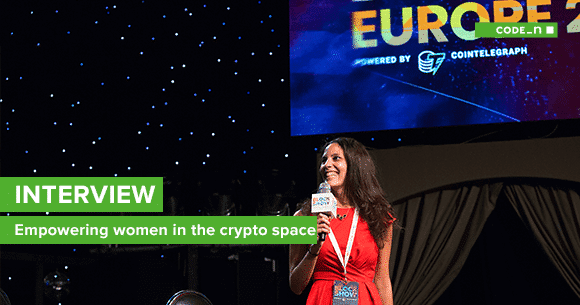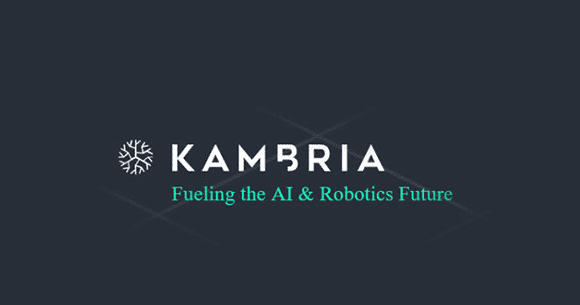Women in Blockchain and Crypto | An interview with Rachel Wolfson
 We had the pleasure of meeting her almost four years ago as she was working for CODE_n Alumnus and big data startup, SQream Technologies. Now a blockchain guru, forward-thinker and journalist who writes for Forbes and Bitcoin Magazine, Rachel Wolfson is an avid supporter of women in crypto and has been recently listed among the 100 most influential blockchain experts and policy practitioners in the world. It’s been inspiring and uplifting to catch up with her after all this time and see how deeply engaged she is in the blockchain space.
We had the pleasure of meeting her almost four years ago as she was working for CODE_n Alumnus and big data startup, SQream Technologies. Now a blockchain guru, forward-thinker and journalist who writes for Forbes and Bitcoin Magazine, Rachel Wolfson is an avid supporter of women in crypto and has been recently listed among the 100 most influential blockchain experts and policy practitioners in the world. It’s been inspiring and uplifting to catch up with her after all this time and see how deeply engaged she is in the blockchain space.
Iulia: Hi Rachel! To get us started, please tell us a little bit about yourself, your career path and what led you to become a technical writer.
Rachel: My professional journey started six years ago. At that time, I was living in Tel Aviv, working as the Content Marketing, PR and Social Media Manager for a Big Data startup called SQream Technologies. That’s when I started writing about tech topics, such as machine learning, big data, the Internet of Things, demystifying all these buzzwords and hot tech terms. I then moved to San Francisco to work for another startup in the DevOps space. Basically, that’s how I got my feet wet as a technical writer and startup consultant. About a year and a half ago, someone reached out to me and asked if I could write about blockchain. To be honest, at that point, I had never heard about the technology, I had no clue what a distributed ledger was or what cryptocurrency meant. Nevertheless, I got myself prepared and wrote my first article about blockchain. I didn’t stop there, I continued contributing content about blockchain and eventually I started writing for the Huffington Post. The articles attracted more and more readers and people kept reaching out to me with new ideas, telling me more about how the technology works.
Iulia: Can you give a brief explanation of what blockchain technology can do? What are the main use cases you came across so far?
Rachel: The basic definition is that blockchain is a decentralized distributed ledger running on a peer-to-peer network of computers. So, it takes away any third-party intermediaries. Not only is it peer-to-peer, but it’s also transparent in the sense that every transaction made on a blockchain is publicly visible to anyone who participates in the network. Blockchain technology can benefit a large number of industries. There are thousands of use cases and probably the most popular ones are in the financial sector, an industry that blockchain is poised to completely revolutionize. But there are also other sectors where blockchain technology and cryptocurrency are having a great impact on, such as the gaming industry for instance. The technology can also be applied in healthcare and the supply chain management industry.
Iulia: How far do you think we are from adopting cryptocurrency payments at a worldwide level?
Rachel: I recently spoke with venture capitalist and inspiring entrepreneur, Tim Draper, and he predicts that Bitcoin is going to hit $250,000 by the year 2022. He believes that the US dollar and the euro will disappear and that everyone will be using cryptocurrency in 4 to 5 years from now. I kind of agree with him and soon you’ll be able to go into a coffee shop and purchase your coffee using your phone with cryptocurrency. People are going to start using cryptocurrency on a wider level. Bitcoin might become a universal payment because blockchain technology makes it so easy to use. You don’t need to have a bank account anymore. People can just literally take out their phone, scan their digital wallet and make a payment.
Iulia: What is the benefit of using cryptocurrencies? What are the risks?
Rachel: Well, many people find it fascinating that Bitcoin can be worth $8000 one day and $1000 the next day. I think that’s the benefit. The volatility is pretty cool. Another aspect I would mention here is that there are no third parties involved in the process and that the transactions are transparent, everything is peer-to-peer. Additionally, transaction fees are much lower, which is another reason why it is great for banking. Nevertheless, there are risks when using cryptocurrencies – such as the DNS hijackings happening lately. Digital wallets aren’t secure enough because hackers can access private information and take your cryptocurrency. That’s one of the main risks. A solution could be to use a hardware wallet and store your private keys offline. Having all of your money online is simply too risky. I believe security is extremely important and unfortunately, the topic hasn’t been brought to the table as much it should have been. We need to raise awareness around the vulnerability of using digital wallets and that’s something I’m also doing in the recent articles I’ve published.
Iulia: The tech industry seems to be filled with men. What do you think about the lack of inclusion of women in the crypto space?
Rachel: My personal opinion is that indeed, there aren’t as many women as men in tech and in the crypto space and I often think about it. It could be that women often feel intimated in the technical fields. When I first started to write about blockchain, I was freaked out. “Virtual money”, “digital ledger”, all these terms sounded a bit like a video game, nothing made sense to me at the beginning, but I think that being a woman in tech is actually not bad at all, because you get recognized, you stand out. You attend conferences and when you’re one of the few women out there, people are impressed by that. In the industries that I’ve been around, people have generally been very welcoming towards me. I believe that being a woman in the crypto industry is an advantage, because currently, there aren’t many of us. I’ve been treated very fairly and kind as a woman writer in this industry.
Iulia: How did you manage to overcome your fear? You mentioned that you freaked out the first time you had to write about blockchain.
Rachel: I just told myself – I’m a strong writer. I love writing and I have the ability to read about a technology and make it simple for anybody to understand. I gave it my best shot, accepted the project and my first article came out great. People liked it and asked for more content about it. So simply “take the risk”! That’s my advice. If you fail, you fail. If you don’t, that’s great.
 Iulia: You’ve been recently named as one of the most important people involved in the growth of the blockchain ecosystem. What would be, in your opinion, the best way to raise the profile of women in tech and the crypto space in particular?
Iulia: You’ve been recently named as one of the most important people involved in the growth of the blockchain ecosystem. What would be, in your opinion, the best way to raise the profile of women in tech and the crypto space in particular?
Rachel: For a long time, I thought that going to conferences and having all-women panels was useful. But I’ve come to realize that rather than raising awareness for women in this space, it creates a negative effect by grouping women together, and instead of talking about the main tech topics, women end up talking about their roles. That’s not helping in any way the industry. A way to help the industry and elevate women is to have panels with men alongside women exchanging on these main topics, such as security, new cryptocurrencies, algorithms. Conference organizers should just include women on their most relevant panels. These opinions may not appeal to everyone because all-women panels continue to be a trend in the tech industry. The exciting thing about cryptocurrency and blockchain is that they are new technologies, so there are still chances for early innovation, in other words, we could start to see less all-women panels at the upcoming tech events.
Iulia: What do you think is the future of blockchain in the next 5-10 years?
Rachel: Blockchain technology will become bigger than the internet and I think that in the next 5 to 10 years it’s going to be used in every single industry as it’s breaking so many barriers. It serves as a trusted third party that we can all go to for security and safety.
Iulia: How could we make people trust the technology and adopt it?
Rachel: It’s the same as with every new technology. It’s hard to adopt it right away. Raising awareness through conferences, useful content, podcasts and simply explaining to people what the technology can do and how it can be applied in almost all industries can be very helpful. Here in Silicon Valley they’re already teaching blockchain classes and that’s going to be another trend that we see. The rising demand for blockchain technology is naturally signaling the need for a pool of blockchain talent all over the world. Universities will start teaching blockchain and people will become more and more educated about it.
Iulia: Many startups have started to explore how this technology can change the way the world works. What would be in your opinion the most favorable environment for blockchain startups to succeed and thrive?
Rachel: There a lot of startups here in Silicon Valley and I’m sure it’s the same case in Germany and throughout Europe. I think that if you want to succeed in this space, you must be educated to do so. We therefore need to have very good developers, engineers in order to build the technology. Secondly, you need to have a roadmap, a good team of smart people who know how to apply the technology in the right way.
Iulia: What are the blockchain startups we should keep an eye on in 2018?
Rachel: There are many startups out there, but if I had to choose, I would say that an interesting startup to watch this year is BitGuild. They launched a revolutionary, decentralized platform for a new class of games that live on the blockchain. As the CEO Jared Psigoda explained, they are changing the gaming industry by giving power back to the gamers and letting them fully own their in-game virtual items, equipment and currencies, instead of having companies own and control all the assets, which is the current status quo.
Another startup that caught my attention is CyberMiles. They are creating a blockchain specifically for e-commerce. The company is building an entirely new type of network, opening up the online marketplace by allowing ordinary people to create and execute smart contracts. The third startup that I’ll definitely keep an eye on is TrueUSD that provides a long-awaited stable trading instrument for cryptocurrency traders, and enables consumers and businesses to use a cryptocurrency as a medium of exchange. Their aim is to build a stable coin that you can redeem 1-for-1 for US dollars. They have a very good technology and strong roadmap behind them.
Iulia: Any final thoughts?
Rachel: I’m very happy to be a writer and an early innovator in the emerging field of blockchain technology. I’m living and breathing it every single day and I am convinced that our future is digital and blockchain and cryptocurrencies will change the world as we know it.
Iulia: Thanks for this great interview, Rachel! Blockchain technology is indeed poised to disrupt many industries in the coming years and we’re sure that women like you will play a big role in the revolution.





Comments